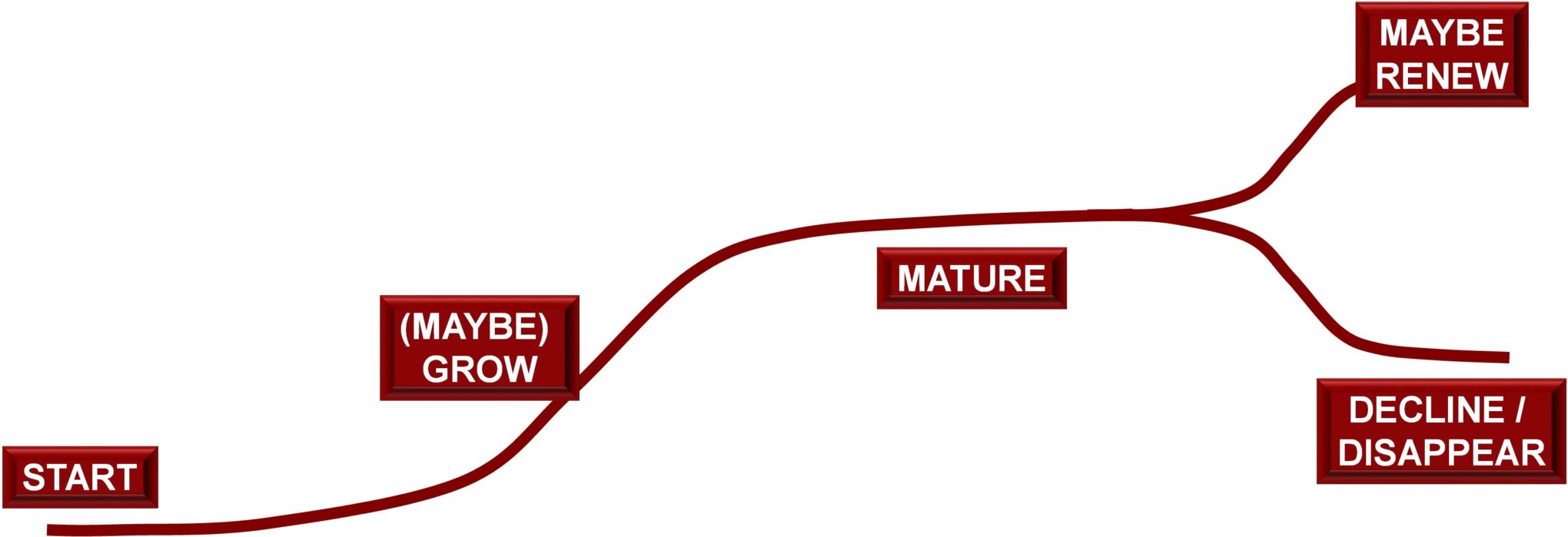Lifecycles are Destiny
When you consider your business, your career, and even your life — lifecycles are destiny. Some questions to be addressed are simple, but not always easy to answer. But first, some stories to consider.
- Sears started in 1893. It had strong growth in the early 20th century and matured around the middle of the century. In its prime, it was “the Amazon” of it’s day. It become irrelevant by the start of the 20th century and is pretty much dead today.
- Motorola was the dominant cell phone manufacturer until they lost out to Nokia, who then lost out to Apple. Will Apple dominate through the 21st century or will they lose out to XXX?
- Some lifecycles are short. How’s your Beanie Baby collection?
- Some lifecycles are incredibly long. What’s going to replace salt?
- Some companies renew themselves. Is Apple a computer company with a cell phone division or a smartphone company with a computer division?
Companies either follow the curve or drop from sight. Montgomery Ward and American Motors are gone. Amazon seems to be maturing, while Tesla might keep growing.
Lifecycles are destiny.
Question One – Where are you and your company?
This question sets the stage for the work yet to be accomplished. The organization, culture, policies, and procedures of a start-up might get you to the growth portion of the curve, but usually will fail as you approach maturity.
And the same goes for your skills. What “got you here” may not “get you there.” Too many great technologists found their people skills lacking when their organization grew.
Lifecycles are destiny – if you know where you are along the curve, you know what’s yet to be undertaken.
Question Two – What might cause problems?
Here are three categories to consider:
- CUSTOMERS: You may have appealed to “early adopters” and have neglected to consider the needs and wants of mainstream customers. Or you forget that your retail customers age a day at a time and changes are almost invisible. Millennials are getting “old” and Gen-Z are looking for something else. Oh, and if you appeal to Boomers I’m sorry to say that we’re going to more funerals than weddings. Human lifecycles are destiny as well.
- TECHNOLOGY: According to the World Economic Forum “The Fourth Industrial Revolution represents a fundamental change in the way we create, exchange, and distribute value. It is a technological shift merging our physical, digital, and biological worlds into one. The fast-developing technologies pushing it forward, such as artificial intelligence, genome editing, augmented reality, robotics, and 3-D printing, are promising smart solutions for intractable challenges.” Are you ready? Lifecycles are destiny.
- COMPETITION: The start of the cycle is always alive and there are people and companies entering your industry every day. You probably know a lot about your existing competitors. GM knew how to fight Ford and Chrysler. Was GM ready for Tesla? Walgreens and CVS know how to fight each other. What are they going to do with Amazon Pharmacy?
If you are going to intercept the future you need to know where you are today and accept the fact that lifecycles are destiny.
This is the third of nine posts addressing some of the topics from our new hybrid course, Intercept the Future. (Composed of three parts – Learn from the Past, Respond to the Present , and Intercept the future.)
Next week I’ll return to comment on Learn from the Past and address the challenge of “Ask why — not who.”
Cheers,
Bill
Never miss out!
Get an email update every time I publish new content. Be the first to know!

